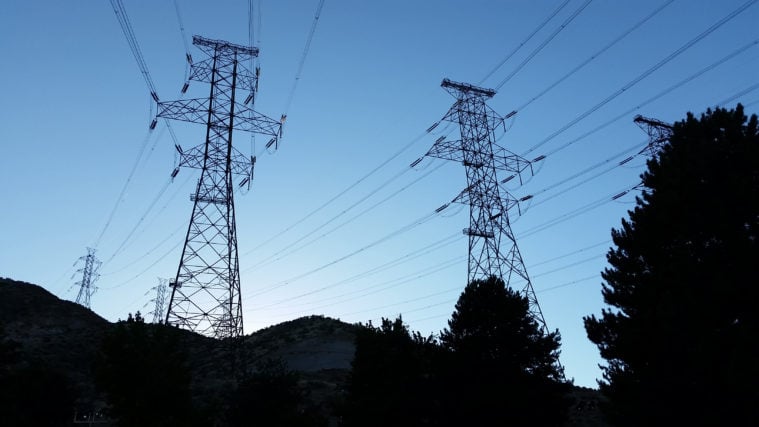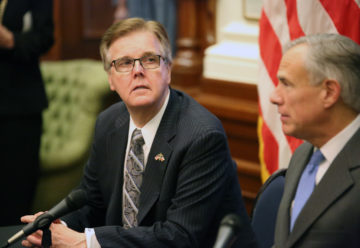Welcome to the 87th Legislative Session. Since the last session came to a close in June 2019, Texas has been hit by an unrestrained pandemic and a crippling economic crisis—and now the fallout from deadly blackouts. Under unprecedented circumstances, lawmakers are faced with a number of urgent challenges. The Texas Observer is following along every step of the way.
Go here for last week’s dispatch from the state Capitol.
What We’re Following:
Jamail Amron called 911 the night of September 30, 2010, worried he was hyperventilating—a bad reaction to some cocaine he’d just taken. When paramedics arrived and tried talking Amron, 23, into the back of an ambulance, he told them he’d changed his mind and instead walked to a nearby Burger King drive-thru, knocked on the window, and asked for water. The worker who gave him a cup later testified in a court deposition that Amron had just crouched to the curb to sit and drink when Harris County constables sped into the parking lot. One jumped out of his car, yelling, “If you try to hurt me, I will not hesitate to knock the fuck out of you,” before handcuffing Amron and pinning him to the ground.
The initial report from the Precinct 4 constable’s office stated that Amron appeared to die in their custody from medical distress unrelated to any use of force. However, two witnesses saw an officer press his boot over Amron’s nose and mouth for several minutes before he stopped breathing—pushing so hard, one of them said, “I could tell the arch of the neck was going flat along with the asphalt.”
Last fall, after George Floyd’s murder sparked outrage over police violence and calls for reform across the country, State Representative Senfronia Thompson, a Houston Democrat, invoked Amron’s death to argue for state action to curb police abuses in a Houston Chronicle op-ed. “The similarities between the two cases, despite the decade between them, speak to the fact that the dual crises of police brutality against Black and brown people and the lack of accountability have been going on for years.”
On Thursday, Thompson introduced House Bill 88, otherwise known as the George Floyd Act, a package of reforms that civil rights activists and victims of police violence have been pushing in Texas for years—including prohibiting chokeholds and restricting use of force, enacting a duty for officers to intervene when they see others using excessive force, and ending legal protections that often shield officers who maim or kill people.
The bill is also the latest attempt to curb arrests for fine-only offenses. And it would require corroborating the testimony of undercover officers before a drug bust, which reformers asked for after racist, trumped-up drug stings in Tulia became widely known more than two decades ago. That provision could have prevented not only the Tulia scandal but also a more recent one in Houston involving bogus drug cases that culminated in a fatal raid based on false information in 2019. Prosecutors have said that more than 150 drug cases brought by the Houston Police Department stretching back at least a decade may need to be overturned, including George Floyd’s 2004 arrest by the disgraced officer at the heart of the recent bogus drug scandal who is now facing criminal charges.
Floyd’s family and friends were among many who talked about the personal toll of police brutality while testifying in support of the bill at Thursday’s hearing. “I’ve been unjustly done along with George Floyd, we’ve been stopped together, I know how they treat us,” said Travis Cains, an old friend of Floyd’s from his days living in Houston’s Third Ward neighborhood. Barbara Coats, Jamail Amron’s mother, urged lawmakers to pass the reforms because, “I never want any mother or father to feel the way I do, my prayer is that this never happens to anybody else.”
The push by Texas Democrats to pass an omnibus police reform package this session underscores how outrage over Floyd’s murder changed local policy debates around policing. Last year, after Austin police seriously injured several people who protested in the wake of Floyd’s death, the city passed a plan to cut about a third of its $434 million police budget. In San Antonio, reformers secured a ballot proposition for the upcoming May election that could strip the city’s police union of its negotiating power with the city.
The George Floyd Act faces opposition from police groups, several of which testified against the bill, and a larger conservative backlash to the growing calls for systemic changes to policing. Elsewhere inside the Capitol on Thursday, Republican lawmakers in the House State Affairs Committee presented a trio of bills aimed at punishing cities that reduce police spending—parroting Governor Greg Abbott, who has threatened a takeover of policing in Austin since the city cut its police budget last year.
Black lawmakers in Texas have called the George Floyd Act, many elements of which have also been filed as standalone bills, a top priority for the session. State Representative Ron Reynolds, a Fort Bend Democrat and co-author of the legislation, compared the moment after Floyd’s killing to that following the heinous murder of Emmett Till in 1956, which helped galvanize the Civil Rights Movement. “Something positive came out of his tragic death,” Reynolds said on Thursday. “I believe this is another watershed moment in our country, and George Floyd’s death is the catalyst.”
What We’re Reading:

Texas lawmakers slow-walking desperately needed electric grid reforms
As columnist Chris Tomlinson writes, everyone from Abbott down to the most junior state representative has promised new measures to ensure the grid never fails Texans again. But so far, we’ve seen more talk than action. And most of the action has been to provide cover to an energy industry that failed when we needed it most. / Houston Chronicle
After Atlanta and Colorado mass shootings, Texas GOP leaders double down on protecting gun owners
After the two latest mass shootings, Texas Republicans are doubling down on gun-owner rights—and against President Joe Biden and congressional Democrats who are renewing their push for gun-control reforms. “They are gonna come to get your guns,” Abbott said at a GOP party function on Tuesday, the day after the mass shooting in Colorado. Texas lawmakers are in session for the first time since the state’s own back-to-back mass shootings in 2019, which prompted Abbott and Lieutenant Governor Dan Patrick to acknowledge the need for potential reform to state gun laws. Now? Not so much. / Texas Tribune

Dan Patrick declares war on “green” Wall Street investors
As R.G. Ratcliffe writes, sticking it to the tree-huggers of New York in favor of the oil and gas industry may be good politics in most of Texas. But the theory of Patrick’s bill—which would require the state’s pension and education funds to divest from financial firms that are shifting away from fossil fuel—is that Texas can use its weight and the threat of pulling its assets from investors who “boycott” oil and gas to single-handedly force Wall Street to reverse course. But that theory just doesn’t match with reality. / Texas Monthly
All Hat, No Cattle
The Texas Legislature is known for its outlandish members, ludicrous antics, and right-wing flare-ups. Here’s your weekly dose.
State Representative Briscoe Cain’s tenure as the new House Elections Committee chairman is off to a blundering start. On Thursday, Cain’s committee held a hearing on House Bill 6, the GOP’s sweeping “election integrity” legislation. Cain is the author of the bill, which cracks down on local election administrators’ ability to expand voter access—as urban counties like Harris County did during the 2020 election with tremendous success—and further criminalizes violations of state voting laws, as well as adding a host of other new hurdles.
Democrats and voting-rights advocates alike have condemned the legislation, blasting it as yet another instance of Texas Republicans making it harder for people to vote. About 200 Texans showed up at the Capitol to testify before the committee. Many, including former Congressman Beto O’Rourke— traveled from hours away in order to sound off on the bill. They never got the chance.
Jessica González, a Dallas Democrat and the committee’s vice chair, presided over the hearing as Cain laid out the bill—and struggled to answer questions from Democratic members because, he claimed, he hadn’t fully read through his own bill. But when González tried to recognize state Representative Nicole Collier, a Dallas Democrat, to ask questions, Cain interjected and a brief standoff ensued.
“Vice Chair González, at this moment, you are not chairing this committee,” Cain said as he blocked her attempts to let Collier speak. “I’m not recognizing anyone but a member of this committee at this time.” Cain abruptly said the committee would recess for lunch, then return to hear witness testimony.
Collier is the chair of the Texas Legislative Black Caucus, which had previously requested permission to participate in the hearing because there are no Black members on the House Elections Committee.
After the recess, Cain returned to say that the hearing was over because as he rushed to break for lunch, he had failed to announce what time the committee would reconvene—a violation of House rules. That meant Cain (who calls himself a “Parliamentary guru” in his Twitter bio) would have to schedule a new hearing and start the process over again. “Even though I wish very much to continue today’s hearing, the rules prevent me from doing so,” he said. “Please forgive me for my error.”
Ironically, Cain’s bill isn’t so forgiving of those who violate the rules—even by mistake. In addition to a slate of other new election crimes, his legislation would make it a felony if a person helps a voter with disabilities fill out their mail ballot with inaccurate information.







